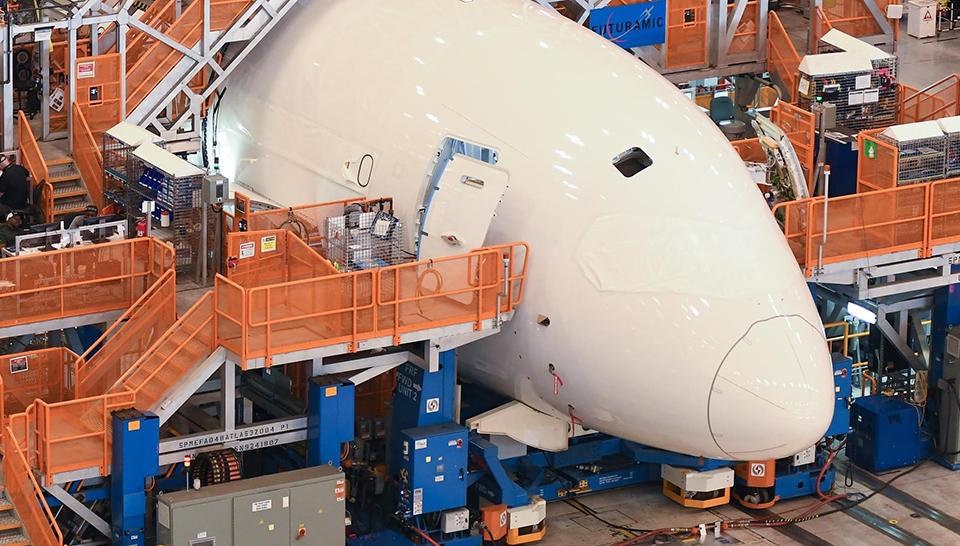
COLORADO SPRINGS and WASHINGTON—Boeing has temporarily halted deliveries of 787s from its Charleston, South Carolina, production facility while it conducts additional analysis on the fuselage's forward pressure bulkhead.
The newest hold up to deliveries, which only resumed last August after a 14-month stoppage due to production quality issues, is another blow to Boeing’s hopes of returning to a production rate of five 787s per month later this year.
Although re-worked 787s are gradually being delivered, the production of all-new aircraft has hardly crept above one per month, due mostly to continuing supply chain issues. According to Aviation Week Network’s Fleet Discovery, Boeing has not delivered a new 787 since Jan. 26. Just three 787s were handed over to customers in January after averaging about seven per month from September-December 2022, the first four full months following its August delivery re-start.
“Boeing temporarily halted deliveries of 787 Dreamliners after notifying the FAA that it is conducting additional analysis on a fuselage component,” the FAA said in a statement. “Deliveries will not resume until the FAA is satisfied that the issue has been addressed.”
According to sources familiar with the situation, deliveries were halted after the discovery of an engineering analysis error related to the bulkhead. The same sources say the analysis error is considered an FAA non-compliance and is therefore a documentation problem. The delivery pause was first reported by the Wall Street Journal.
Boeing says that “in reviewing certification records, Boeing discovered an analysis error by our supplier related to the 787 forward pressure bulkhead. We notified the FAA and have paused 787 deliveries while we complete the required analysis and documentation. There is no immediate safety of flight concern for the in-service fleet. Production continues and this is not expected to increase airplane rework. We are communicating with our customers and will continue to follow the lead of the FAA. While near-term deliveries will be impacted, at this time we do not anticipate a change to our production and delivery outlook for the year.”
The latest analysis error is thought to be unrelated to the previous issue with the forward pressure bulkhead which was discovered in mid-2021 during an FAA review of the Boeing processes used to check the fuselage joins. At that time, the company was asked to inspect the interface between the forward pressure bulkhead and the surrounding forward fuselage structure. The inspection found gaps that exceeded maximum tolerance and forced Boeing to the decision that the forward pressure bulkhead on every undelivered aircraft would need to be removed and replaced.
Boeing subsequently discovered that the fatigue analysis for the bulkhead had been based on incorrect thermal loads. The fix required updated analysis, new limits on inspection intervals and a redesign—most of which was released to engineering by late May 2022. The fixes required the calculation of an updated airworthiness limitation, which will reduce the inspection threshold at which the bulkhead should be inspected from the current 44,000 cycles to an as-yet unspecified number.
Boeing is also meanwhile tackling another non-compliance issue related to the trim air muffler—part of the environmental control system which helps control cabin air temperature. The company is thought to have discovered quality escapes with the component, which is provided by a sub-contractor to Collins, the supplier of the air system.
The trim air muffler was inspected and later cleared of being the cause of the diversion to St. Johns, Newfoundland, of a British Airways 787-10 flight from Boston to London on Feb. 10 due to suspected smoke in the cabin.


Comments